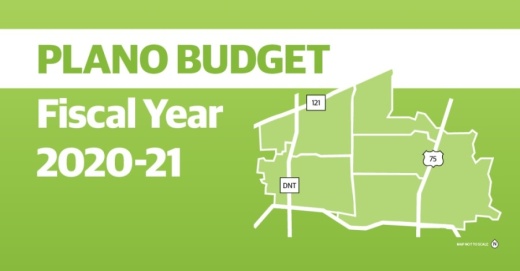The total proposed budget for fiscal year 2020-21 is roughly $604.7 million, which is a slightly more than $3 million increase over the approved budget for fiscal year 2019-20. City Council members listened to the recommendations at an Aug. 15 work session.
The budget acknowledges pandemic-driven cuts to revenue sources, such as sales taxes, permit and license fees, and hotel and motel revenues, Israelson said. But the recommendations also continue Plano's commitment to improving infrastructure, providing services for citizens, keeping sound financial policies, retaining personnel, and approving the second consecutive no-new-revenue property tax rate, he said.
During a recent re-estimate of costs from fiscal year 2019-20, the city found that it came closer to a $588.4 million budget for the year, according to the proposed budget documentation presented in the work session. This decline of close to $12.9 million from the budget originally approved is largely due to cost-saving measures taken this spring and summer, such as hiring freezes and the delay of non-urgent city projects, Israelson said.
These decisions and the roughly $5.5 million in funding from the Coronavirus Aid, Relief, and Economic Security Act toward the 2019-20 general fund were pivotal in planning the fiscal year 2020-21 budget, he said.
Some other highlights from the city's recommended budget include:
1. Increased revenue from property taxes
While council members have indicated they plan to adopt a rate of no higher than 44.82 cents per $100 of assessed property valuation—the same as last year's rate—the budget will raise roughly $7 million more in property taxes than the year before. Of that amount a little more than $3.7 million will be raised from new properties, while the remainder will come from rising valuations of properties that were already on the tax roll, according to city staff. Plano is anticipating those taxes shifting into losses from the pandemic in later budget years.
2. A 5% reduction
Most departments throughout the city are seeing a 5% cut in the new budget. This adds up to roughly $2.7 million in reductions to adjust for losses from the pandemic. Among those cuts is a 1.9% reduction in general fund expenses. The general fund's revenues come directly from property taxes, sales tax collections and franchise fees.
3. Stabilized water cost, with an increase for wastewater
The contracted water cost is remaining at the same rate of $2.99 per thousand gallons for 2020-21 for residents. Conservation efforts and more rainfall over the past year allow for the city to keep the rate same for the upcoming year. Wastewater, on the other hand, and the Upper East Fork Interceptor, will increase from $3.65 per thousand gallons to $3.78 per thousand gallons. Wastewater revenue is expected to increase by 5% in 2020-21.
4. A rate increase for drainage at Collin Creek Mall
There will be a residential and commercial rate increase to the city's municipal drainage fund in order to cover the cost of renovations for the drainage culvert at Collin Creek Mall. The residential increase amount is roughly $959,000 and the commercial rate increase will be close to $1 million. An additional increase will likely be needed in November, and Plano city staff has budgeted a projected $50 million debt sale for the redevelopment project.
5. An additional $1.3 million for books
In the proposed budget, roughly $1.3 million is included for library books, e-books and e-audiobooks in the Library Administration Fund. Objectives for the city library system include expanding outreach and the delivery of classes and educational programs through its #morethanbooks program.
A full breakdown of the proposed fiscal year 2020-21 budget and Community Investment Program for the city of Plano can be viewed here and the work session can be viewed here. Next steps for the budget include the public hearing for the property tax rate, the adoption of the operating budget, the Community Investment Program and the setting of the tax rate Sept 14; and the new fiscal year beginning under an adopted budget Oct. 1.





